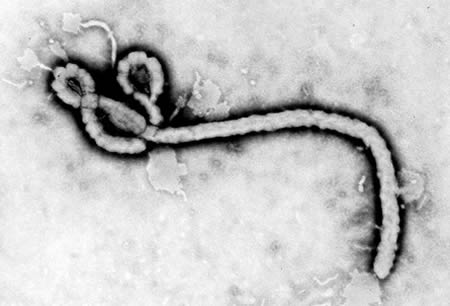Resumo
Definition
History and exam
Key diagnostic factors
- exposure to an orthoebolavirus in previous 21 days
- fever
- myalgia
- conjunctival injection
Other diagnostic factors
- fatigue
- anorexia
- diarrhea
- vomiting
- severe headache
- abdominal pain or heartburn
- cough, dyspnea, chest pain
- sore throat
- prostration
- tachypnea
- maculopapular rash
- bleeding
- hepatomegaly
- lymphadenopathy
- hiccups
- tachycardia
- hypotension
- neurologic signs
Risk factors
- living or working in, or arrival from, endemic area in previous 21 days
- contact with infected body fluids
- occupational exposure
- butchering or consumption of meat from infected (or potentially infected) animals
- bioterrorism
Diagnostic tests
1st tests to order
- reverse transcriptase-polymerase chain reaction (RT-PCR)
- malaria investigations
Tests to consider
- serum electrolyte levels
- BUN/serum creatinine
- blood lactate
- ABG
- CBC
- coagulation studies
- urinalysis
- LFTs
- serum amylase level
- blood cultures
- serum blood glucose
- antigen-capture enzyme-linked immunosorbent assay (ELISA)
- serology
- chest x-ray
Treatment algorithm
Contributors
Authors
Catherine F. Houlihan, MSc, MB ChB, MRCP, DTM&H
Clinical Lecturer
University College London
Honorary Clinical Lecturer
London School of Hygiene and Tropical Medicine
London
UK
Disclosures
CFH declares that she has no competing interests.
Manuel Fenech, MD, MRCP, DTM&H
Specialist Trainee in Infectious Diseases
Royal Liverpool University Hospital
Liverpool
UK
Disclosures
MF declares that he has no competing interests.
Tom E. Fletcher, MBE, MBChB, MRCP, DTM&H
Wellcome Trust/MoD Research Fellow
Liverpool School of Tropical Medicine
Liverpool
UK
Disclosures
TEF is an author of a number of references cited in this monograph. TEF is a consultant/expert panel member to the World Health Organization, and is funded by the UK Surgeon General and the Wellcome Trust. TEF has received research grants from the Medical Research Council and the UK Public Health Rapid Support Team (UK-PHRST).
Acknowledgements
Dr Catherine F. Houlihan, Dr Manuel Fenech, and Dr Tom E. Fletcher would like to thank Dr Nicholas J. Beeching, a previous contributor to this topic, and Dr Colin Brown (Infectious Disease Lead, Kings Sierra Leone Partnership) for his helpful comments and insights.
Disclosures
NJB was partially supported by the National Institute of Health Research Health Protection Unit in Emerging and Zoonotic Infections at the University of Liverpool and Public Health England. NJB is an author of references cited in this topic. CB declares that he has no competing interests.
Peer reviewers
William A. Petri, Jr, MD, PhD, FACP
Wade Hampton Frost Professor of Epidemiology
Professor of Medicine, Microbiology, and Pathology
Chief
Division of Infectious Diseases and International Health
University of Virginia
Charlottesville
VA
Disclosures
WAP declares that he has no competing interests.
Luis Ostrosky-Zeichner, MD, FACP, FIDSA, FSHEA
Professor of Medicine and Epidemiology
UT Health Medical School
Medical Director of Epidemiology
Memorial Hermann Texas Medical Center
Houston
TX
Disclosures
LO-Z declares that he has no competing interests.
Stephen Mepham, MRCP (UK), FRCPATH, DTM&H, MD
Consultant in Microbiology and Infectious Diseases
Royal Free London NHS Foundation Trust
London
UK
Disclosures
SM declares that he has no competing interests.
Peer reviewer acknowledgements
BMJ Best Practice topics are updated on a rolling basis in line with developments in evidence and guidance. The peer reviewers listed here have reviewed the content at least once during the history of the topic.
Disclosures
Peer reviewer affiliations and disclosures pertain to the time of the review.
References
Key articles
World Health Organization. Clinical care for survivors of Ebola virus disease: interim guidance. Apr 2016 [internet publication].Full text
World Health Organization. Guidelines for the management of pregnant and breastfeeding women in the context of Ebola virus disease. 2020 [internet publication].Full text
World Health Organization. Infection prevention and control guideline for Ebola and Marburg disease. Aug 2023 [internet publication].Full text
World Health Organization. Optimized supportive care for Ebola virus disease. July 2019 [internet publication].Full text
Lamontagne F, Fowler RA, Adhikari NK, et al. Evidence-based guidelines for supportive care of patients with Ebola virus disease. Lancet. 2018 Feb 17;391(10121):700-8.Full text Abstract
World Health Organization. Clinical management of patients with viral haemorrhagic fever: a pocket guide for the front-line health worker. Feb 2016 [internet publication].Full text
World Health Organization. Therapeutics for Ebola virus disease - Democratic Republic of the Congo. Aug 2022 [internet publication].Full text
Reference articles
A full list of sources referenced in this topic is available here.
Use of this content is subject to our disclaimer

